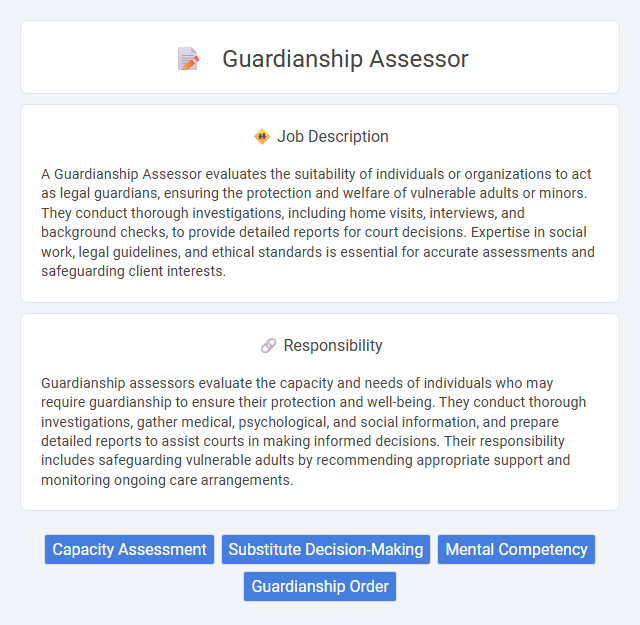
A Guardianship Assessor evaluates the suitability of individuals or organizations to act as legal guardians, ensuring the protection and welfare of vulnerable adults or minors. They conduct thorough investigations, including home visits, interviews, and background checks, to provide detailed reports for court decisions. Expertise in social work, legal guidelines, and ethical standards is essential for accurate assessments and safeguarding client interests.
Guardianship assessors likely need strong empathy and analytical skills to evaluate the condition of vulnerable individuals accurately. The job may suit those who can balance compassion with objective judgment, as assessing mental, emotional, and physical states is critical. Candidates prone to stress or discomfort in emotionally challenging situations may find this role less suitable.
Qualification
Guardianship assessors must possess a background in social work, psychology, or law, with relevant certification or licensure depending on jurisdictional requirements. Expertise in evaluating an individual's capacity and understanding of legal and ethical standards is essential for effective assessment. Strong analytical skills and experience in client advocacy contribute to accurate and compassionate guardianship recommendations.
Responsibility
Guardianship assessors evaluate the capacity and needs of individuals who may require guardianship to ensure their protection and well-being. They conduct thorough investigations, gather medical, psychological, and social information, and prepare detailed reports to assist courts in making informed decisions. Their responsibility includes safeguarding vulnerable adults by recommending appropriate support and monitoring ongoing care arrangements.
Benefit
Guardianship assessor roles likely offer considerable benefits, including the opportunity to positively impact vulnerable individuals by ensuring their safety and well-being. The position may provide professional growth through specialized experience in legal and social services, enhancing expertise in risk assessment and decision-making processes. Job stability and rewarding personal fulfillment are probable advantages, given the essential nature of protecting individuals who cannot make decisions for themselves.
Challenge
Guardianship assessors likely face the challenge of navigating complex family dynamics while ensuring the best interests of vulnerable individuals are met. They probably encounter situations requiring careful judgment to balance legal obligations with compassionate care decisions. Managing emotional stress and maintaining objectivity under pressure may consistently test their professional skills.
Career Advancement
Guardianship assessors play a critical role in evaluating individuals' mental capacity and recommending appropriate protective arrangements, providing a foundation for career growth in social services and legal sectors. With experience, professionals can advance to senior assessor roles, program management, or specialized positions such as mental health advocacy and elder law consultancy. Continuous education and certifications in social work or legal studies enhance upward mobility and open opportunities in policy development and organizational leadership.
Key Terms
Capacity Assessment
Guardianship assessors specialize in conducting capacity assessments to evaluate an individual's ability to make informed decisions about personal, financial, and medical matters. These professionals utilize standardized tools and clinical interviews to determine cognitive function, decision-making skills, and understanding of relevant risks. Accurate capacity assessment is critical for recommending appropriate guardianship arrangements to protect vulnerable adults while respecting their autonomy.
Substitute Decision-Making
Guardianship assessors evaluate individuals' capacity to make informed decisions, focusing on substitute decision-making to protect vulnerable adults who cannot manage their own affairs. They conduct comprehensive assessments involving financial, medical, and personal welfare domains to recommend appropriate guardianship arrangements. These professionals ensure compliance with legal standards while advocating for the least restrictive interventions to maintain the autonomy and dignity of the person under assessment.
Mental Competency
A Guardianship assessor specializes in evaluating an individual's mental competency to determine their ability to make informed decisions about personal and financial matters. This role requires thorough psychological assessments, reviewing medical records, and interviewing the subject and relevant parties to establish mental capacity. Accurate mental competency evaluations are crucial for legal guardianship cases to ensure protection and appropriate care.
Guardianship Order
Guardianship assessors play a critical role in evaluating individuals' capacity to manage personal and financial affairs, ensuring decisions align with legal standards for a Guardianship Order. They conduct thorough investigations and interviews to provide detailed reports that influence court rulings regarding appointing guardians. Expertise in legal criteria and ethical considerations is essential for safeguarding the rights and welfare of vulnerable adults under Guardianship Orders.
 kuljobs.com
kuljobs.com